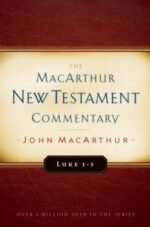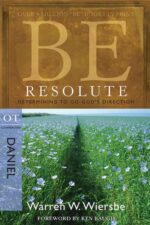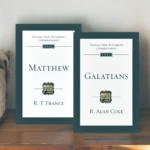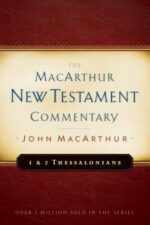Related products
-
Luke 1-5: John MacArthur New Testament Commentary
$22.99The MacArthur New Testament Commentary series comes from the experience, wisdom, and insight of one of the most trusted ministry leaders and Bible scholars of our day. Each volume was written to be as comprehensive and accurate as possible, dealing thoroughly with every key phrase and word in the Scripture without being unnecessarily technical. This commentary will help to give a better, fuller, richer understanding of God’s Word, while challenging the reader to a vibrant personal spiritual walk.
$29.99 -
Be Resolute: Daniel (Warren Wiersbe)
$13.99We’ve all heard the phrase: When the going gets tough, the tough get going. What about faith? Will your faith thrive in tough times? Do you desire a more resolute faith?
$16.99 -
Tyndale New Testament Commentaries – All 20 Volumes
$375.00This outstanding set has earned a reputation as reliable, accessible, and relevant. Penned by distinguished evangelical scholars, each volume’s introduction offers in-depth information on the authorship, date, and historical background of biblical works; while the commentary examines main themes, individual verses, and problems of interpretation. An essential resource for pastors, teachers, and laypeople
$540.00 -
1 & 2 Thessalonians: John MacArthur New Testament Commentary
$22.99The MacArthur New Testament Commentary series comes from the experience, wisdom, and insight of one of the most trusted ministry leaders and Bible scholars of our day. Each volume was written to be as comprehensive and accurate as possible, dealing thoroughly with every key phrase and word in the Scripture without being unnecessarily technical. This commentary will help to give a better, fuller, richer understanding of God’s Word, while challenging the reader to a vibrant personal spiritual walk.
$29.99 -
God’s Rascal: The Jacob Narrative in Genesis 25-35 (Dale Ralph Davis)
$12.75Beloved author Dale Ralph Davis looks at one of the most fascinating characters in the Bible, and the God who was faithful to him.
The character of Jacob that we meet in chapters 25–35 of Genesis is a fascinating one. A kaleidoscopic blend of deviousness and doggedness, of trickery and tenacity, of folly and faith. As readers we can’t help being drawn into his story. With his trademark wit and perceptive comments Dale Ralph Davis guides us through the story of this rogue and traces the evidence of grace, providence, blessing throughout his life.
Taking us chapter by chapter through this fundamental section of scripture, Davis highlights not only the character of Jacob, but the character of the God who cared for him and faithfully kept his promises to him.
$14.99






save
$25.01Expository Thoughts on the Gospels 7-Volume Set (J. C. Ryle)
$149.99
$175.00In these volumes Ryle shows again that, as in all his writing and preaching, he was first and foremost a pastor, and as J. I. Packer has pointed out, ‘alongside the question “Is it true?” the question “What effect will this have on ordinary people?” was always in his mind’.
In stock
Expository Thoughts on the Gospel 7-Volume Set
Endorsements
‘We prize these volumes. They are diffuse, but not more so than family reading requires. Mr. Ryle has evidently study all previous writers upon the Gospels, and has given forth an individual utterance of considerable value.’ — C.H. SPURGEON
‘What he [Ryle] gives are expository thoughts, crystallized nuggets of pastoral and spiritual insight designed to help pilgrims on their journey through this world and to the next.’ — DEREK THOMAS
Gospel of Matthew – 1 Volume As the first Gospel in the New Testament, Matthew was, not surprisingly, the first to be published in J. C. Ryle’s series of Expository Thoughts on the Gospels (1856). Ryle’s expositions are a rich combination of doctrinal and practical comments on the Gospel text.
Ryle’s Expository Thoughts can be used as a help in family worship, or as an aid in pastoral visitation, or simply as a companion to the Gospels in the private reading of Scripture.
Gospel of Mark – 1 Volume First published in 1857, Mark was the second book to appear in J. C. Ryle’s series of Expository Thoughts on the Gospels.
The earliest of the Gospel narratives to be written, Mark, says Ryle, ‘is singularly full of precious facts about the Lord Jesus, narrated in a simple, terse, pithy, and condensed style’. Those last four adjectives could well be used to describe Ryle’s own comments on the Gospel!
Gospel of Luke – Volume 1 and Volume 2 Within a year of publishing Mark in his Expository Thoughts on the Gospels series, J. C. Ryle had, in 1858, completed the Gospel of Luke.
Written specifically for a non-Jewish readership, Luke’s Gospel is perhaps the most ‘accessible’ of the narratives of the life of Christ for modern readers. Ryle’s desire for his readers mirrors that of Luke Luke 1:4), that they might gain ‘a more clear knowledge of Christ, as a living person, a living priest, a living physician, a living friend, a living advocate at the right hand of God, and a living Saviour soon about to come again’.
Gospel of John – Volume 1, Volume 2 and Volume 3 ‘The Gospel of St. John, rightly interpreted, is the best and simplest answer to those who profess to admire a vague and indistinct Christianity.’ There were many such in J. C. Ryle’s day, as in our own, and these final three volumes of his Expository Thoughts on the Gospels series provide a detailed commentary upon, and ‘right interpretation’ of the fourth Gospel.
In these volumes Ryle shows again that, as in all his writing and preaching, he was first and foremost a pastor, and as J. I. Packer has pointed out, ‘alongside the question “Is it true?” the question “What effect will this have on ordinary people?” was always in his mind’.
About the Author
In 1841, Ryle was ordained as a minister in the Church of England. In his first position in a rural parish he developed the plain and direct style of communication that would mark his future ministry. He served at several churches for the next forty years, during which time he wrote hundreds of evangelistic tracts. He was a wildly popular writer. His tracts sold more than 12 million copies in his lifetime, and were eventually translated into about a dozen European and Asian languages.
While his ministry flourished, Ryle’s home life was challenging. In 1844, he married his first wife, who died in 1847. He married again in 1849. The couple was happy, but his wife’s health was poor, so the pastor seldom travelled and practically raised his children alone. When his second wife died in 1860, he became a single father with five children between 2 and 14 years old.
Despite these hardships, Ryle became a leader among the evangelical clergy in his day. In 1880, he was appointed the first bishop of the newly formed diocese of Liverpool. Because the diocese was new, it had no system of leadership, no formal administration. During his tenure as Bishop of Liverpool, Ryle raised enough funds to build 90 new houses of worship, ordained over 500 deacons, 500 ministers, and at least 45 salaried lay Scripture readers and 31 Bible women. He founded the Lay Helpers Association, an organization that oversaw Sunday schools, Bible classes, mission services, and cared for sick.
Customer Reviews
There are no reviews yet.